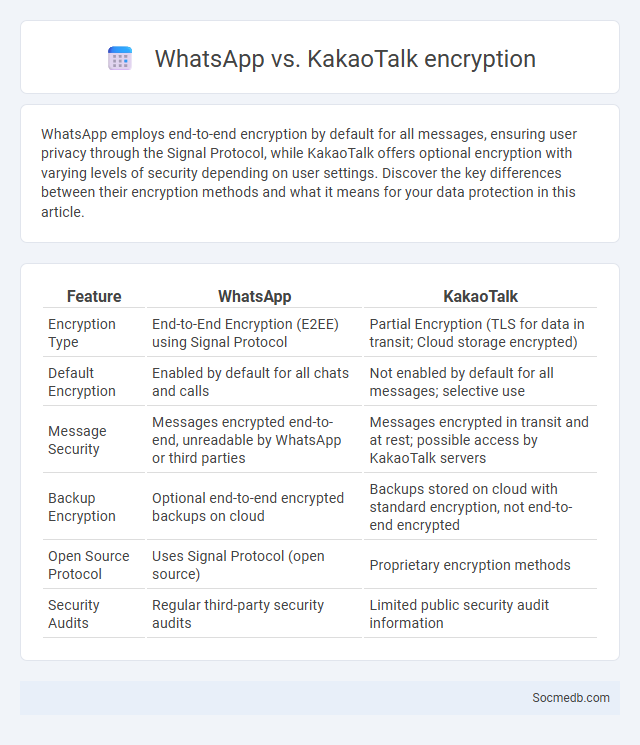
Photo illustration: WhatsApp vs KakaoTalk encryption
WhatsApp employs end-to-end encryption by default for all messages, ensuring user privacy through the Signal Protocol, while KakaoTalk offers optional encryption with varying levels of security depending on user settings. Discover the key differences between their encryption methods and what it means for your data protection in this article.
Table of Comparison
| Feature | KakaoTalk | |
|---|---|---|
| Encryption Type | End-to-End Encryption (E2EE) using Signal Protocol | Partial Encryption (TLS for data in transit; Cloud storage encrypted) |
| Default Encryption | Enabled by default for all chats and calls | Not enabled by default for all messages; selective use |
| Message Security | Messages encrypted end-to-end, unreadable by WhatsApp or third parties | Messages encrypted in transit and at rest; possible access by KakaoTalk servers |
| Backup Encryption | Optional end-to-end encrypted backups on cloud | Backups stored on cloud with standard encryption, not end-to-end encrypted |
| Open Source Protocol | Uses Signal Protocol (open source) | Proprietary encryption methods |
| Security Audits | Regular third-party security audits | Limited public security audit information |
Overview: WhatsApp vs KakaoTalk Encryption
WhatsApp employs end-to-end encryption by default, ensuring that only you and your chat recipients can read messages, using the Signal Protocol for secure communication. KakaoTalk offers encryption primarily for sensitive conversations, with a separate "Secret Chat" feature that uses AES-256 encryption, though regular chats are less protected. Choosing between WhatsApp and KakaoTalk for secure messaging depends on your preference for always-on encryption versus selective, feature-based privacy controls.
Understanding End-to-End Encryption
End-to-end encryption ensures that only you and the intended recipient can access the content of your social media messages, making your communications secure from hackers and service providers. This technology uses cryptographic keys stored exclusively on users' devices, preventing interception during transmission. Understanding how end-to-end encryption works helps you safeguard your privacy and maintain control over your digital conversations.
How WhatsApp Implements Encryption
WhatsApp employs end-to-end encryption to secure your messages, ensuring that only you and the recipient can read the content. This encryption uses the Signal Protocol, which generates unique encryption keys for every chat, preventing third parties, including WhatsApp itself, from accessing your data. By implementing this robust cryptographic framework, WhatsApp guarantees privacy and confidentiality across calls, texts, photos, and videos shared on its platform.
KakaoTalk’s Encryption Methods Explained
KakaoTalk employs advanced encryption methods such as end-to-end encryption (E2EE) to secure your messages, ensuring that only you and the recipient can access the content. The platform utilizes the Signal Protocol, renowned for its robust key exchange mechanism and forward secrecy, which protects conversations even if encryption keys are compromised. By integrating these encryption techniques, KakaoTalk maintains high standards of privacy and security in its social media communications.
Key Differences in Encryption Standards
Social media platforms differ significantly in their encryption standards, with some using end-to-end encryption (E2EE) like WhatsApp and Signal, ensuring that only communicating users can read messages. Others, such as Facebook Messenger and Instagram, primarily rely on transport layer security (TLS), which protects data during transmission but not at rest. This distinction impacts user privacy, data security, and vulnerability to unauthorized access.
End-to-End Encryption: Security Benefits
End-to-end encryption (E2EE) in social media ensures that messages, calls, and shared content are only accessible to the communicating users, safeguarding sensitive information from hackers, service providers, and third parties. Platforms like WhatsApp and Signal deploy advanced cryptographic protocols to maintain data integrity and privacy, preventing unauthorized interception during transmission. This security measure significantly reduces the risk of data breaches and enhances user trust by guaranteeing confidentiality throughout digital interactions.
Metadata Handling in WhatsApp vs KakaoTalk
Metadata handling in WhatsApp emphasizes end-to-end encryption, limiting the exposure of user data such as message timestamps and contact information to protect Your privacy. KakaoTalk, while employing encryption protocols, collects more extensive metadata including device information and usage patterns, which may be used for personalized services and advertising. Understanding these differences helps You make informed decisions about which platform better suits Your privacy preferences in social media communication.
Privacy Policies and Data Protection
Social media platforms implement detailed privacy policies to safeguard your personal data, outlining how information is collected, stored, and shared with third parties. Data protection practices such as encryption, access controls, and regular security audits reduce the risk of data breaches and unauthorized access. Understanding these policies empowers you to manage your privacy settings effectively and maintain control over your digital footprint.
Vulnerabilities and Security Concerns
Social media platforms face significant vulnerabilities including weak password protection, phishing attacks, and unauthorized data access, exposing user information to cybercriminals. Security concerns center around privacy breaches, identity theft, and the spread of malware through malicious links and fake accounts. Robust encryption, multi-factor authentication, and regular security audits are essential measures to mitigate these risks and protect user data.
Choosing the Safer Messaging App
Selecting a safer messaging app requires evaluating end-to-end encryption protocols, user privacy policies, and the app's data retention practices. Popular options like Signal and Telegram offer robust encryption and minimal metadata storage, reducing exposure to data breaches. Prioritizing apps with open-source code and regular security audits enhances protection against cyber threats and unauthorized access.
 socmedb.com
socmedb.com